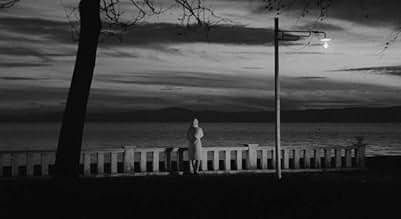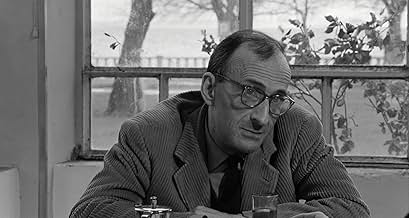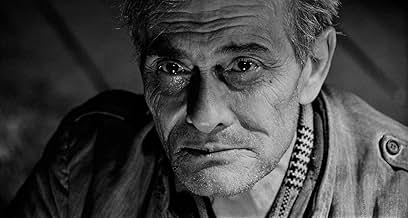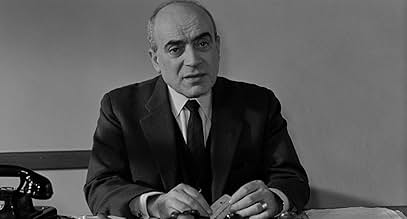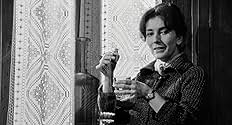AVALIAÇÃO DA IMDb
7,0/10
1,7 mil
SUA AVALIAÇÃO
Adicionar um enredo no seu idiomaWhile visiting his favorite resort town during the off-season, a novelist investigates the apparent suicide of a woman he was infatuated with.While visiting his favorite resort town during the off-season, a novelist investigates the apparent suicide of a woman he was infatuated with.While visiting his favorite resort town during the off-season, a novelist investigates the apparent suicide of a woman he was infatuated with.
- Direção
- Roteiristas
- Artistas
Pia Lindström
- Adriana
- (as Pia Lindstrom)
Pier Giovanni Anchisi
- Francesco - Photographer
- (as Piero Anchisi)
Anna Maria Gherardi
- Servant Girl
- (as Anna Gherardi)
Jean Rougeul
- The Journalist
- (não creditado)
Avaliações em destaque
Some people consider this a proto-giallo. It kind of is, in the same way The Girl Who Knew Too Much resembles a giallo, actually it's a 'woman gone missing' mystery shot in black and white where a lot of the usual giallo tropes are absent for the simple reason they had not been mapped down yet; the same movie made ten years later would have probably been shot in garish Technicolor, the murders would take place on screen and we'd be treated to the black-gloved hand of the murderer. A lot of common giallo themes can be found here though, sexual obsession, distorted memory, a chain of events is unlocked when a character visits a place of his past, the boundaries between reality and fantasy/madness blurred by something that may or may not be a product of the mind, yet I'd place the movie closer to the psychological horror Polanski was yet to do than Mario Bava, or a movie that would influence the gialli of Sergio Martino more than those of Dario Argento.
If you take it apart to study the parts it was made of, you'll find a lot of familiar ideas reconfigured together in similar ways in other movies. This is the type of movie where a fiction writer (who is "dead inside" by his own admission) arrives at a remote town by a lake to look for a girl who presumably committed suicide a year ago, the town streets are empty and there's talk of a family harboring a "terrible secret", the writer stays at an old hotel where according to the suave-creepy owner "he's the only resident" because it's off-season, at some point a photo of the dead woman is presented that throws a new light into the situation, and there's a mysterious slaughterhouse behind the hotel that looks like the abandoned warehouse Nosferatu hauls his coffin to in Murnau's 1922 film.
The movie does a lot of something I find annoying: a scene where people behave in odd ways or has a certain kind of offbeat atmosphere plays out and then we cut to a shot of the writer jolted awake in his bed back at the hotel. Bazzoni is a little too quick to point out "DREAM SCENE!!" to his audience, a little too quick to reassure the viewer that "this part that didn't make sense wasn't really supposed to" so that as the movie begins to morph into something else we're lulled back to the safe environment of the genre picture, where the protagonist can narrate his thoughts in voice-over and where 'dream scene' appears to be the director's way of saying "I want to shoot with the whites washed out".
But even that is not what it seems, because at some point we get the flashback of a memory of something that happened in one of the writer's previous stays in the hotel, the writer walks up the stairs and spies on a love scene between the dead woman and a man he can't identify, and we get extreme closeup shots of an eye watching this through a keyhole. Later this memory is expanded upon in the writer's mind and what we saw at first suddenly takes new meaning so that the love scene may had not been a love scene and the victim may had not been the victim after all, but it doesn't become clear whether this is a repressed memory unlocked by circumstance or a wish fulfillment dream, the writer furnishing a twisty conclusion worthy of one of his pulpy books to an incident that remains unexplained and ambiguous like most real life situations usually are. Fittingly this new twist feels very film noir, deceit and greed is involved and for a moment the moral universe of the film is turned on its head.
This is what I take from the Lady of the Lake, like the blurry photo that is only a magnified detail of a larger frame, the sense of mystery partially revealed to us for a moment then withdrawn from our eyes again. Now the mystery is ours, literally to inhabit the memory. Or better yet, there's a strange melancholy woman in a white coat who walks by the beachwalk every night by herself and we watch her stroll under the lamp posts from the window of our hotel room. One morning she's found dead and if only we'd have gone down there to talk to her while there was still time.
Near the end the movie shifts from eye-level Shining track shots of hotel corridors to vertical shots of the protagonist going down a spiral staircase, the whole geography is now inverted, and we're invited inside the mysterious slaughterhouse for the big reveal. There we get portrait shots steeped in shadow and claw-like hands emerging in silhouette from behind a white glass panel. It's all a bit like we're seeing the seedy industrial locations of Tetsuo through the wintry viewfinder of Sven Nykvyst, or like fetish filmmaker Maria Beatty had brought her inky blacks to the glowy diffused whites of Funeral Parade of Roses.
For the end the movie feels the need to explain itself and provide a definitive conclusion, with the villain recounting the whodunit details to the protagonist, and then in very melodramatic fashion a crazed woman is running down the beach, arms flailing wildly. The Italo-horror fan will savour the whole thing start to finish, but there's enough surreal oddity here to make even the Last Year at Marienbad crowd sit down and take notice.
If you take it apart to study the parts it was made of, you'll find a lot of familiar ideas reconfigured together in similar ways in other movies. This is the type of movie where a fiction writer (who is "dead inside" by his own admission) arrives at a remote town by a lake to look for a girl who presumably committed suicide a year ago, the town streets are empty and there's talk of a family harboring a "terrible secret", the writer stays at an old hotel where according to the suave-creepy owner "he's the only resident" because it's off-season, at some point a photo of the dead woman is presented that throws a new light into the situation, and there's a mysterious slaughterhouse behind the hotel that looks like the abandoned warehouse Nosferatu hauls his coffin to in Murnau's 1922 film.
The movie does a lot of something I find annoying: a scene where people behave in odd ways or has a certain kind of offbeat atmosphere plays out and then we cut to a shot of the writer jolted awake in his bed back at the hotel. Bazzoni is a little too quick to point out "DREAM SCENE!!" to his audience, a little too quick to reassure the viewer that "this part that didn't make sense wasn't really supposed to" so that as the movie begins to morph into something else we're lulled back to the safe environment of the genre picture, where the protagonist can narrate his thoughts in voice-over and where 'dream scene' appears to be the director's way of saying "I want to shoot with the whites washed out".
But even that is not what it seems, because at some point we get the flashback of a memory of something that happened in one of the writer's previous stays in the hotel, the writer walks up the stairs and spies on a love scene between the dead woman and a man he can't identify, and we get extreme closeup shots of an eye watching this through a keyhole. Later this memory is expanded upon in the writer's mind and what we saw at first suddenly takes new meaning so that the love scene may had not been a love scene and the victim may had not been the victim after all, but it doesn't become clear whether this is a repressed memory unlocked by circumstance or a wish fulfillment dream, the writer furnishing a twisty conclusion worthy of one of his pulpy books to an incident that remains unexplained and ambiguous like most real life situations usually are. Fittingly this new twist feels very film noir, deceit and greed is involved and for a moment the moral universe of the film is turned on its head.
This is what I take from the Lady of the Lake, like the blurry photo that is only a magnified detail of a larger frame, the sense of mystery partially revealed to us for a moment then withdrawn from our eyes again. Now the mystery is ours, literally to inhabit the memory. Or better yet, there's a strange melancholy woman in a white coat who walks by the beachwalk every night by herself and we watch her stroll under the lamp posts from the window of our hotel room. One morning she's found dead and if only we'd have gone down there to talk to her while there was still time.
Near the end the movie shifts from eye-level Shining track shots of hotel corridors to vertical shots of the protagonist going down a spiral staircase, the whole geography is now inverted, and we're invited inside the mysterious slaughterhouse for the big reveal. There we get portrait shots steeped in shadow and claw-like hands emerging in silhouette from behind a white glass panel. It's all a bit like we're seeing the seedy industrial locations of Tetsuo through the wintry viewfinder of Sven Nykvyst, or like fetish filmmaker Maria Beatty had brought her inky blacks to the glowy diffused whites of Funeral Parade of Roses.
For the end the movie feels the need to explain itself and provide a definitive conclusion, with the villain recounting the whodunit details to the protagonist, and then in very melodramatic fashion a crazed woman is running down the beach, arms flailing wildly. The Italo-horror fan will savour the whole thing start to finish, but there's enough surreal oddity here to make even the Last Year at Marienbad crowd sit down and take notice.
Recently, I had been impressed with Bazzoni's weird offering FOOTPRINTS (1975); so, when I happened upon this even more obscure (and, by all accounts, rarer) earlier title from him, I decided to check it out and, boy, is it a find for Euro-Cult/Art-house buffs! The film, in fact, can perhaps best be described as an arty semi-giallo; interestingly, it contains several echoes to Bazzoni's later effort: the resort town, the central hotel setting, the strange characters encountered by the hero (in FOOTPRINTS, the bewildered protagonist was a woman), the mystery revolving around a missing person not to mention the deliberate (and deliberately-paced) oblique narrative.
What is immediately arresting here (in spite of the somewhat fuzzy quality of the print on display) is the supreme style allotted to the film's look which is wintry, bleak and forbidding by its two directors (incidentally, this was Rossellini's only stint in such capacity!); to this end, they wisely recruited veterans such as cinematographer Leonida Barboni (but who also adopts peculiar framing throughout, none more so that the pan in extreme close-up of a character's face with the gleaming lake for backdrop!) and production designer Luigi Scaccianoce. However, equally important to the fabric of the piece are the contributions of Renzo Rossellini (supplying an appropriately moody score) and editor Nino Baragli (whose frequent jump-cuts and seamless juxtaposition between reality, recollection and outright fantasy create a genuine and admirably disorientating effect on the viewer). Incidentally, THE POSSESSED a misleading English title but a literal translation of the original, THE LADY OF THE LAKE, would be no less ambiguous! was co-written (with Bazzoni and Franco Rossellini) by Giulio Questi; for the record, as a director in his own right, the latter went on to make such idiosyncratic yet haunting revisions of genre convention as the Spaghetti Western DJANGO, KILL IF YOU LIVE, SHOOT! (1967) and the giallo DEATH LAID AN EGG (1968).
The cast is compact but exceptionally noteworthy: Peter Baldwin (very good in Dino Risi's LOVE IN ROME [1960] here, in what I assume to be his most significant role, he's downright excellent!), Salvo Randone (as the owner of the hotel whom the hero suspects of both lechery and murder, he manages to alternate between a genial and sinister countenance throughout), Valentina Cortese (a typically fine performance, though her weather-beaten looks make it hard to convince us she's Randone's daughter even if a reasonable age gap separates the two actors!), Philippe Leroy (having appeared in so many films from the 1960s and 1970s that I've watched in recent years and, thanks also to his remarkable versatility, the French actor has become a firm favorite of mine!), Virna Lisi (while undeniably sensual, her contribution basically amounts to an extended cameo since her character, who seems to have turned the heads of virtually the entire male cast at some point, is already dead when the film opens and we only see the girl in flashback/fantasy sequences!) and Pia Lindstrom (a rare cinematic appearance by Ingrid Bergman's elder daughter being similarly steeped in mystery, alas, she too is barely given time to create a flesh-and-blood character but, then, her resultant fragile performance emerges to be all the more moving for it!).
The plot concerns an author (Baldwin) arriving off-season at a resort town he habitually retired to in order to work, hoping to meet again a servant-girl (Lisi) he's enamored of employed at the hotel run by Randone; however, he's told she's no longer there but notices that her cloak is still hanging in the closet, follows a woman in the streets he sees wearing it (and is eventually disappointed to learn the outfit now belongs to Lisi's replacement). Typically, he decides to delve deeper into the mysterious circumstances surrounding the former maid's demise still, Randone and his family (Cortese assists in the managing of the establishment while brother Leroy owns a butcher shop situated in the courtyard of the hotel itself and, coincidentally, has just returned from his honeymoon with wealthy but naïve and sickly bride Lindstrom) generally evade his probing. Even the only man who's willing to help at first a hunchbacked local photographer (I'm not sure about the actor's name but his face is awfully familiar!), who presents Baldwin with a photo in which Lisi is visibly pregnant suddenly opts out and leaves town in a hurry!; then, there's Lisi's alcoholic bum of a father who seems to have nothing of value for the hero to work on venting the anger and frustration over his daughter's loss by bursting into vitriolic (but ineffectual) nightly rants outside the hotel windows! At one point, Lindstrom makes a weak attempt to communicate with Baldwin but, before they can meet (he had previously noticed the girl walking aimlessly by the lake at night a number of times, but never quite mustered the nerve to confront her), she too is found dead! Eventually, the hero starts to think he may have gotten it all wrong: perhaps Lisi wasn't so much a victim of circumstance (periodically abused by both father and son!) as a femme fatale who got killed simply because she was too greedy.
The final revelation then, takes things in another direction altogether; while certainly effectively handled, the scene does perhaps constitute a slight let-down as it won't surprise anyone familiar with Mario Bava's THE GIRL WHO KNEW TOO MUCH (1963), actually the film credited with originating the giallo tradition, in which Cortese also features
What is immediately arresting here (in spite of the somewhat fuzzy quality of the print on display) is the supreme style allotted to the film's look which is wintry, bleak and forbidding by its two directors (incidentally, this was Rossellini's only stint in such capacity!); to this end, they wisely recruited veterans such as cinematographer Leonida Barboni (but who also adopts peculiar framing throughout, none more so that the pan in extreme close-up of a character's face with the gleaming lake for backdrop!) and production designer Luigi Scaccianoce. However, equally important to the fabric of the piece are the contributions of Renzo Rossellini (supplying an appropriately moody score) and editor Nino Baragli (whose frequent jump-cuts and seamless juxtaposition between reality, recollection and outright fantasy create a genuine and admirably disorientating effect on the viewer). Incidentally, THE POSSESSED a misleading English title but a literal translation of the original, THE LADY OF THE LAKE, would be no less ambiguous! was co-written (with Bazzoni and Franco Rossellini) by Giulio Questi; for the record, as a director in his own right, the latter went on to make such idiosyncratic yet haunting revisions of genre convention as the Spaghetti Western DJANGO, KILL IF YOU LIVE, SHOOT! (1967) and the giallo DEATH LAID AN EGG (1968).
The cast is compact but exceptionally noteworthy: Peter Baldwin (very good in Dino Risi's LOVE IN ROME [1960] here, in what I assume to be his most significant role, he's downright excellent!), Salvo Randone (as the owner of the hotel whom the hero suspects of both lechery and murder, he manages to alternate between a genial and sinister countenance throughout), Valentina Cortese (a typically fine performance, though her weather-beaten looks make it hard to convince us she's Randone's daughter even if a reasonable age gap separates the two actors!), Philippe Leroy (having appeared in so many films from the 1960s and 1970s that I've watched in recent years and, thanks also to his remarkable versatility, the French actor has become a firm favorite of mine!), Virna Lisi (while undeniably sensual, her contribution basically amounts to an extended cameo since her character, who seems to have turned the heads of virtually the entire male cast at some point, is already dead when the film opens and we only see the girl in flashback/fantasy sequences!) and Pia Lindstrom (a rare cinematic appearance by Ingrid Bergman's elder daughter being similarly steeped in mystery, alas, she too is barely given time to create a flesh-and-blood character but, then, her resultant fragile performance emerges to be all the more moving for it!).
The plot concerns an author (Baldwin) arriving off-season at a resort town he habitually retired to in order to work, hoping to meet again a servant-girl (Lisi) he's enamored of employed at the hotel run by Randone; however, he's told she's no longer there but notices that her cloak is still hanging in the closet, follows a woman in the streets he sees wearing it (and is eventually disappointed to learn the outfit now belongs to Lisi's replacement). Typically, he decides to delve deeper into the mysterious circumstances surrounding the former maid's demise still, Randone and his family (Cortese assists in the managing of the establishment while brother Leroy owns a butcher shop situated in the courtyard of the hotel itself and, coincidentally, has just returned from his honeymoon with wealthy but naïve and sickly bride Lindstrom) generally evade his probing. Even the only man who's willing to help at first a hunchbacked local photographer (I'm not sure about the actor's name but his face is awfully familiar!), who presents Baldwin with a photo in which Lisi is visibly pregnant suddenly opts out and leaves town in a hurry!; then, there's Lisi's alcoholic bum of a father who seems to have nothing of value for the hero to work on venting the anger and frustration over his daughter's loss by bursting into vitriolic (but ineffectual) nightly rants outside the hotel windows! At one point, Lindstrom makes a weak attempt to communicate with Baldwin but, before they can meet (he had previously noticed the girl walking aimlessly by the lake at night a number of times, but never quite mustered the nerve to confront her), she too is found dead! Eventually, the hero starts to think he may have gotten it all wrong: perhaps Lisi wasn't so much a victim of circumstance (periodically abused by both father and son!) as a femme fatale who got killed simply because she was too greedy.
The final revelation then, takes things in another direction altogether; while certainly effectively handled, the scene does perhaps constitute a slight let-down as it won't surprise anyone familiar with Mario Bava's THE GIRL WHO KNEW TOO MUCH (1963), actually the film credited with originating the giallo tradition, in which Cortese also features
The Lady in the Lake is often seen as a precursor to the Giallo style that would reach it's peak in the early seventies; and I can certainly see why. However, I would say that the film is closer to a supernatural mystery film than a Giallo and it also shares a lot in common with the popular American film noir style; stemming from it's picture, execution and subject material. The film is very much of the high quality variety and director Luigi Bazzoni takes time and a lot of care to ensure that the film is haunting and mysterious as possible - which pays dividends as the plot starts to pan out. We focus on Bernard; a writer who goes to spend some time in a dilapidated hotel where he spent some time the previous year. Once he gets there, he begins searching for Tilde; a young maid he fell in love with during his previous visit, but he's surprised by the news that Tilde killed herself. However, it would appear that there is more to the apparent suicide as Bernard is shown a picture suggesting she was pregnant...
The film is directed by Luigi Bazzoni, who go on to make one of the best seventies Giallo's with the excellent The Fifth Cord as well as one of the oddest genre films with Footsteps in 1975. There's also a writer's credit for Death Laid an Egg writer-director Giulio Questi, so rather unsurprisingly - The Lady of the Lake is a rather bizarre film! It starts off simple enough and the first half of the movie is pretty easy viewing, but then things start to get a bit stranger in the second half and it becomes easy to loose the plot. It's lucky then that there's more than enough to keep the audience otherwise entertained. The cinematography is absolutely gorgeous and the black and white picture allows the director to capture a real macabre and moody atmosphere. The town in which the film takes place is a masterpiece within itself - the ghostly local population in particular is memorable. The plot comes back together towards the end and the film does give closure to its central plot line. Overall, The Lady of the Lake will probably not please all viewers; but it's a very well made mystery and anyone that considers themselves a fan of Italian cinema should check it out!
The film is directed by Luigi Bazzoni, who go on to make one of the best seventies Giallo's with the excellent The Fifth Cord as well as one of the oddest genre films with Footsteps in 1975. There's also a writer's credit for Death Laid an Egg writer-director Giulio Questi, so rather unsurprisingly - The Lady of the Lake is a rather bizarre film! It starts off simple enough and the first half of the movie is pretty easy viewing, but then things start to get a bit stranger in the second half and it becomes easy to loose the plot. It's lucky then that there's more than enough to keep the audience otherwise entertained. The cinematography is absolutely gorgeous and the black and white picture allows the director to capture a real macabre and moody atmosphere. The town in which the film takes place is a masterpiece within itself - the ghostly local population in particular is memorable. The plot comes back together towards the end and the film does give closure to its central plot line. Overall, The Lady of the Lake will probably not please all viewers; but it's a very well made mystery and anyone that considers themselves a fan of Italian cinema should check it out!
The famous writer Bernard (Peter Baldwin) travels to a small town nearby a lake to spend vacation out of season in the winter. He check in an old hotel owned by Enrico (Salvo Randone) and his daughter Irma (Valentina Cortese) expecting to meet the maid Tilde (Virna Lisi), from whom he had a crush last time he visited the town. However, he discovers that Tilde has committed suicide and when he meets the local photographer (Piero Anchisi), Bernard learns that she was pregnant. He becomes obsessed to find whether she really committed suicide and to guess what really happened. When Enrico's son Mario (Philippe Leroy) and his wife Adriana (Pia Lindstrom) arrive at the hotel, Bernard has daydreams about the fate of Tilde.
"La donna del lago", a.k.a. "The Lady of the Lake", is a dark and mysterious Italian film with a simple and inconclusive story. The black and white cinematography is magnificent, with great use of lighting and shadows. The cast is also excellent, supported by an intriguing screenplay with great narrative. Bernard's daydreams are interesting, showing what he is thinking and changing his reality many times. "La donna del lago" is for specific audiences that will certainly enjoy this type of story. My vote is seven.
Title (Brazil): "A Mulher do Lago" ("The Lady of the Lake")
"La donna del lago", a.k.a. "The Lady of the Lake", is a dark and mysterious Italian film with a simple and inconclusive story. The black and white cinematography is magnificent, with great use of lighting and shadows. The cast is also excellent, supported by an intriguing screenplay with great narrative. Bernard's daydreams are interesting, showing what he is thinking and changing his reality many times. "La donna del lago" is for specific audiences that will certainly enjoy this type of story. My vote is seven.
Title (Brazil): "A Mulher do Lago" ("The Lady of the Lake")
Fascinatingly dark and elusive, 'La Donna Del Lago' (aka) 'The Possessed' (1965) ominously remains a thrillingly enigmatic, majestically mysterious, almost impenetrable crypto-Giallo by the consistently excellent film stylist, Luigi Bazzoni, the prodigiously talented, intellectual auteur behind equally idiosyncratic, doom-laden, darkly dreamt anti-Gialli masterpiece, 'Footsteps on the Moon'(1975). Since 'La Donna Del Lago' was also written by fellow dramatic iconoclast, Gulio 'Death Laid an Egg' Questi, one might certainly expect to experience a similarly oblique tone, and in terms of starkly confounding genre conventions, skewed scrivener, Questi most certainly doesn't disappoint! While some might consider 'Lady of The Lake' to be just another indulgent example of overwrought nouvelle vague-esque cinematic doodling; but to blithely dismiss this eerily elegiac work as mere self-indulgence is, perhaps, to miss out of one of Italian genre cinema's most glacial,immaculately shot, singularly strange, wickedly off-key, noggin-scratchingly unique thrillers!
Você sabia?
- ConexõesReferenced in Era Uma Vez em... Hollywood (2019)
Principais escolhas
Faça login para avaliar e ver a lista de recomendações personalizadas
- How long is The Possessed?Fornecido pela Alexa
Detalhes
- Data de lançamento
- País de origem
- Idioma
- Também conhecido como
- The Possessed
- Locações de filme
- Brunico, Bolzano, Trentino - Alto Adige, Itália(lakeside town: street views, shops, train station)
- Empresas de produção
- Consulte mais créditos da empresa na IMDbPro
- Tempo de duração1 hora 25 minutos
- Cor
- Mixagem de som
- Proporção
- 1.85 : 1
Contribua para esta página
Sugerir uma alteração ou adicionar conteúdo ausente

